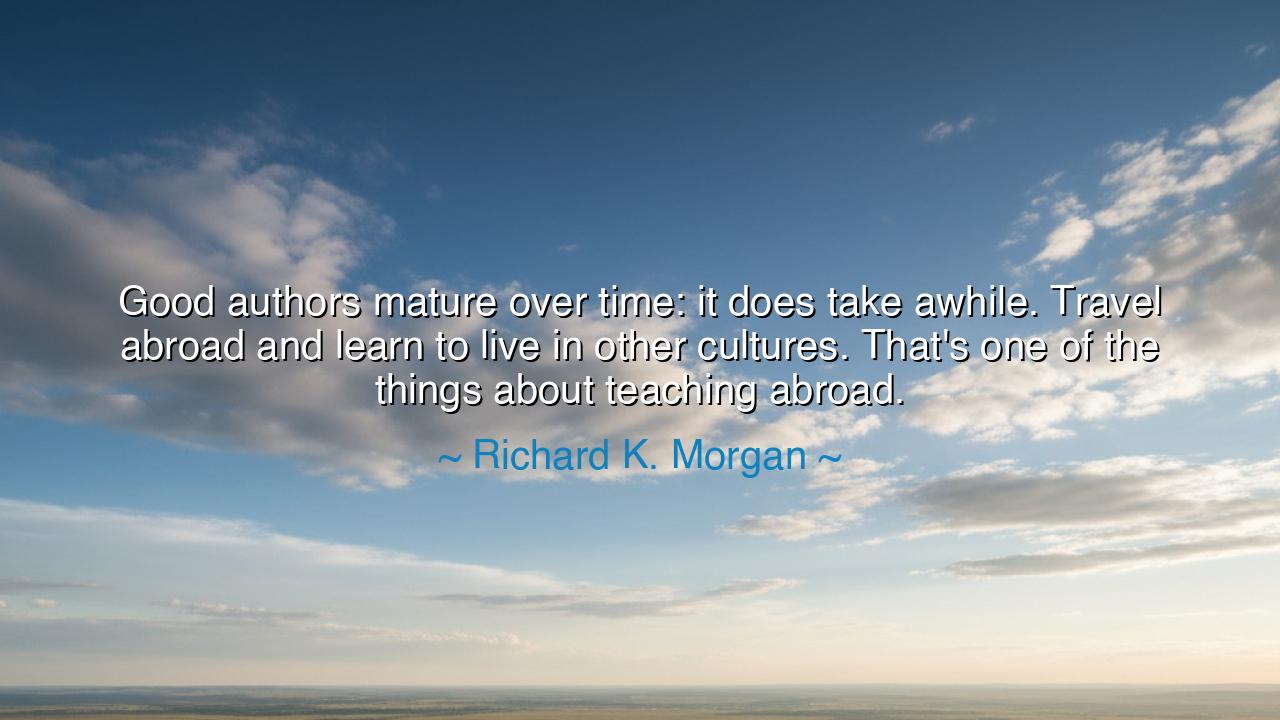
Good authors mature over time: it does take awhile. Travel
Good authors mature over time: it does take awhile. Travel abroad and learn to live in other cultures. That's one of the things about teaching abroad.






Richard K. Morgan, whose pen has carved worlds both strange and true, once declared: “Good authors mature over time: it does take awhile. Travel abroad and learn to live in other cultures. That’s one of the things about teaching abroad.” These words, though born from his reflections on writing, carry a deeper wisdom for all who would seek growth, for they remind us that maturity is not an instant flame but a slow-burning fire, and that the soul ripens only through time, trial, and encounter with the unfamiliar.
To say that authors mature over time is to recognize that art, like life, is a journey. No writer, however talented, springs fully formed like Athena from the head of Zeus. Their words deepen with years, their vision broadens with experience, and their stories gain weight as they themselves are shaped by the world. The call here is not for haste, but for patience: the oak does not grow in a season, nor does the true writer reach fullness in a single book. Wisdom and mastery must be lived into existence.
Yet Morgan adds another stone to this foundation: travel abroad. Why? Because nothing matures the soul more swiftly than stepping beyond the familiar. To live in other cultures is to taste other ways of being, to hear songs sung in strange rhythms, to witness values that challenge one’s own. The author, who must capture humanity in its breadth, cannot confine himself to a single soil. He must roam, as Odysseus roamed, and through his wandering gather stories, voices, and truths that enrich his vision.
History offers countless examples. Think of Ernest Hemingway, who left America to live in Paris among the expatriates, absorbing the wisdom of artists, poets, and strangers. It was in Spain, amidst bullfights and civil war, that his prose gained its sharpness, its economy, its brutal honesty. Or consider the philosopher Montaigne, who traveled through Europe, learning from every land he visited, and returned home to write essays that captured the universality of human nature. Their greatness was not born of isolation, but of encounter.
Morgan also speaks of teaching abroad, for teaching is itself a kind of learning. When one enters another land not merely as a guest but as a guide, one discovers the humility of being both teacher and student. To explain one’s knowledge in the midst of a foreign people is to hold up a mirror to one’s own assumptions, to see what is truly universal and what is but habit. In this way, teaching in other cultures matures the heart, just as writing matures the mind.
The wisdom here extends beyond authorship. For every soul, whether writer or laborer, the path of growth is the same: to give time for patience, to step beyond the borders of comfort, to listen deeply to those who live differently, and to return home changed. The maturity Morgan speaks of is not only for the artist, but for the human being, who must learn through travel and encounter to see the great family of mankind.
Thus, the lesson is clear: do not rush your growth. Let time ripen you. Seek out other cultures, whether by journeying across seas or by welcoming the stories of strangers near your door. Teach what you know, but always be ready to learn what you do not. In doing so, you will not only mature as an author or thinker, but as a soul, wide in vision and deep in compassion.
So, O listener, heed Morgan’s wisdom: good authors mature over time, and so too do good lives. Let patience guide you, let travel broaden you, let teaching humble you, and you will find that every step, every encounter, every culture you touch, becomes part of your story. And when at last you write the tale of your life—whether with pen, with voice, or with deeds—it will be a tale worthy of eternity.






AAdministratorAdministrator
Welcome, honored guests. Please leave a comment, we will respond soon